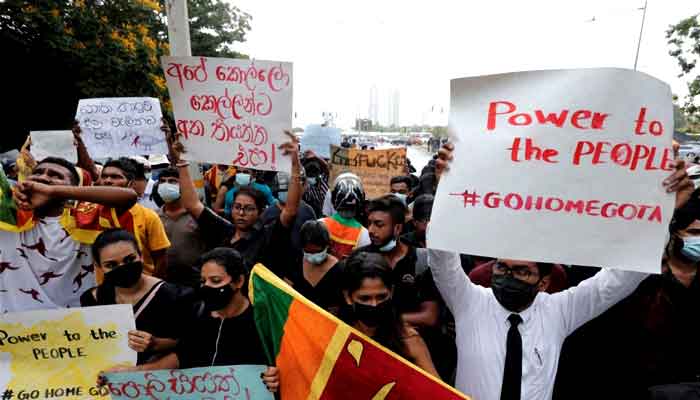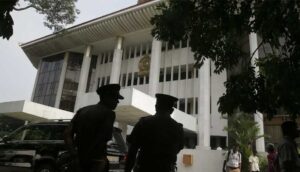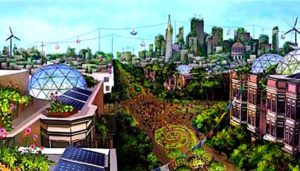Lieutenant Colonel Gotabaya Rajapaksa is the first military officer to be elected president and also the first to have no elected office. He is a classical bonapartist, having risen politically through crushing the JVP youth insurrection in 1987–1989 and serving as Defence Secretary in his brother’s administration in 2005. In this position he celebrated killing the Tamil Tigers’ leader Velupillai Prabhakaran in 2009 and bringing a crushing defeat.
During the war, the economy grew around 5% annually; thereafter it has stumbled along to achieve even 2% growth. His economic policies have been haphazard roller-coaster free marketeering; a sudden burst of tax cuts building budgetary pressures, adamant insistence of organic farming when the country was not prepared, and reckless borrowing from China and elsewhere to build the port infrastructure.
His resolute policies, against advice, arose from his military background, shunning the wheeling and dealing with politicians and seeking to build a lasting family dynasty with his personal stamp on all things. His bonapartism involved rising above society rather than balancing between the classes, and his certainty rested on his militarist background.
Facing low growth, a looming crisis deeper than during the war, the pandemic, a decline in tourism and greater indebtedness, he took zig-zag changes in policy, of which the tax cuts and insistence on organic farming were evidence.
At such times a bold decisive approach is crucial.
After decades of deepening turmoil – uprisings, general strikes, insurrections, communal riots, pogroms, ethnic bloodbaths, massacres, coups and a bloodthirsty civil war lasting almost three decades – civilised life in Sri Lanka today stands on a precipice. Exhausted by daily power cuts lasting up to twelve hours, people are forced to stand in eight-hour queues for supplies of kerosene; hospitals are shutting down and patients dying for want of medication; newspapers cease publication and students are unable to sit examinations for lack of paper. Police and hired thugs are savagely attacking defenceless protesters.
While ruling with military support, state power is disintegrating, its last vestiges of authority bled dry by years of plunder, nepotism and runaway corruption. An explosion of popular outrage has left the country with no government and no coherent parliamentary majority, just a universally reviled president dangling helplessly in mid-air, barely clutching on to office by his fingernails.
The unending protests have suddenly been met with blood and iron. Desperate times brought desperate measures. When Prime Minister Mahinda Rajapaksa tendered his resignation amid an economic crisis and resolute protests, this cleared the way for the iron fist, rather than peaceful negotiations or more resignations. As the meeting closed, his house was used as a staging post for violent attacks on protesters. In response his house was burned to the ground and a national curfew enforced by the army, with the deaths of protesters and opposition members of parliament. His party offices, shops and politicians’ houses have been set on fire in the provinces.
The policy of the iron fist by the Gota dynasty showed a firmer resistance and a determination to hang on to power. With his military background, the president is assured of military support until that grip is broken. Evidently this executive president was unwilling to go even when the bourgeois saw this as wisdom. Instead he is unleashing violence and threats of “ethnic conflict” in attempting to crush the resistance. Apparently he is at the naval base where the British colonial state was based and surrounded with reinforcements; as a military man he commands the loyalty of the military and is turning the guns against the protesters.
This brings a new perspective for rising violence and military brute force, and a possible military coup. Certainly the state is becoming a military based state. This guarantees that there can be no success in the opposition’s plan to form a new government, as envisaged by the national bourgeoisie. The democratic demand for the abolition of the executive presidency can only be achieved by driving through constitutional reforms which the opposition parties are not committed to. There is a parliamentary impasse.
Since no significant economic concessions are possible, given the deep indebtedness of the state, the battle lines are drawn for an all-out struggle for power, and not an imminent departure.
Sri Lanka is a country in which the labour movement once had proud socialist traditions, and which in the early years of independence achieved rates of social welfare, literacy, health care, and education unparalleled in the Indian sub-continent and the whole ex-colonial world. This was the outcome of militant campaigning by a mass socialist party with a strong Marxist tradition, which in 1953 led the historic hartal – an island-wide mass uprising. The inspiring traditions of the Lanka Sama Samaja Party in its early days have now dwindled to a faint memory – but now is the time for its heirs to fight to rebuild them.
An indefinite general strike has been called with the support of 2,000 trade unions – a mass uprising on the scale of the 1953 hartal. It is necessary to issue an urgent public appeal, by whatever means possible – in print, online, at meetings and in constant personal discussions – for the immediate formation of joint action committees bringing together trade union representatives, farmers, small business owners, plantation workers, currently unorganised workers, women’s organisations, students, Tamil groups, Muslims and other oppressed minorities, etc., to take over the essential functions of production and distribution. We can reasonably assume that such tasks are already being tackled at least on an improvised makeshift level on a local scale, just as happened spontaneously in the course of the general strikes in Britain in 1926, France in 1968, and in similar circumstances worldwide. All that is needed is to link up these informal manifestations of dual power into an executive organ of revolution.
Gotabaya Rajapaksa’s days are undoubtedly numbered. “Gota” will go. But how, and through what steps? It is not enough to call merely for the dismissal of the current president; it is necessary to raise the demand for the overthrow of the entire parasitic corrupt ruling class that has brought society to this impasse; to sweep away the whole rotten edifice of the old regime. In April 1917, Lenin urged the insurgent workers, soldiers and peasants to place no trust in the clique of liberal politicians who had hastily occupied the seat vacated by the deposed Tsar, urging no trust in the bourgeois government, and calling for power to be taken into the hands of the proletariat and the poorest sections of the peasants. So too in Sri Lanka today, an immediate appeal should be made to all the trade unions and established mass organisations, and to any informal bodies thrown up in the course of this struggle, as well as to all left and radical parties and groups, with a proposal for joint action to promote this same goal.
Despite the repressive onslaught, it looks most probable the insurgency will grow and squeeze the opposition parties between the masses and the recalcitrant regime. Worker, peasant and youth resistance should be constituted by convening Self Defence Committees based on popular assemblies in the farms, villages, towns and workplaces to drive Gotabaya Rajapaksa from power and undermine his confidence, and break the rank and file in the army from this Bonaparte.
Rather than demanding “power to the people” – a deliberately ambiguous formula which could end in merely replacing the current regime with an equally rotten rival parliamentary clique – it is necessary to fight for power to be taken by the workers who produce the wealth, in alliance with the students and the youth, the peasants, the super-exploited tea plantation workers, the Tamil minority crushed under the military jackboot and the other oppressed minorities; for a democratic socialist Sri Lanka, linking hands with the struggles of workers in India, Pakistan, Bangladesh, Myanmar and the entire sub-continent for a socialist federation.
The struggle for food, fuel and control over the collapsing economy will only be possible through workers’ democracy in Sri Lanka. This is an international struggle as well as one based on national ground. It is already clear that China and India are in firm support of the rising dictatorship, just as they are in the case of the Myanmar military dictatorship.
For workers’ power in Sri Lanka and the South Asian region!





